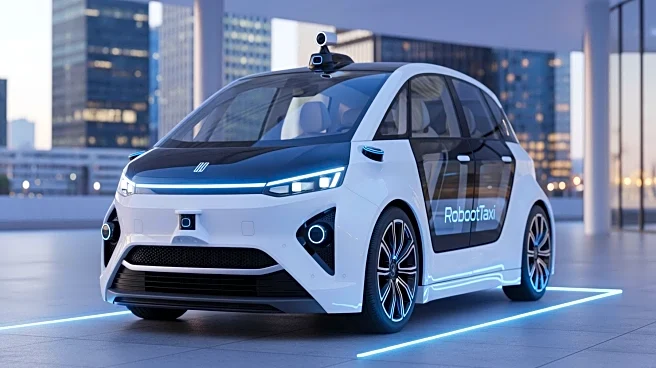What's Happening?
Waymo, a subsidiary of Alphabet Inc., has announced plans to introduce fully autonomous ride-hailing services in San Diego by 2026. The company has already begun mapping parts of the city and will soon
deploy a fleet of all-electric Zeekr RT minivans for testing. These vehicles will operate in autonomous mode but will initially have human drivers for safety. Waymo's expansion into San Diego is part of a broader strategy to tap into high-demand ride-hailing markets, with the city ranking among the top 15 in the U.S. for such services. The company is also planning expansions into Detroit and Las Vegas, having already logged numerous autonomous trips in cities like Los Angeles and San Francisco.
Why It's Important?
The introduction of Waymo's robotaxis in San Diego represents a significant step forward in the adoption of autonomous vehicle technology in the U.S. This move could potentially transform the transportation sector by offering a more sustainable and accessible mode of travel. However, public acceptance remains a challenge, as a recent AAA survey indicates that a majority of U.S. drivers are still apprehensive about self-driving vehicles. Despite this, Waymo's safety record, which shows a significant reduction in serious crashes compared to human drivers, may help alleviate some concerns. The initiative also aligns with San Diego's goals to enhance transportation connectivity and sustainability.
What's Next?
Waymo will continue to work with local officials to secure the necessary permits for its operations in San Diego. The company plans to focus its services in central areas of the city, such as the Gaslamp Quarter and downtown. As the launch date approaches, Waymo will likely intensify its public engagement efforts to build trust and familiarity with its technology. The success of this initiative could influence other cities to adopt similar autonomous transportation solutions, potentially accelerating the broader acceptance of self-driving vehicles across the U.S.
Beyond the Headlines
The deployment of autonomous vehicles raises important ethical and legal questions, particularly concerning liability in the event of accidents. Additionally, the shift towards automation could impact employment in the traditional taxi and ride-hailing sectors. As these technologies become more prevalent, there will be a need for updated regulatory frameworks to address these challenges. Furthermore, the environmental benefits of electric autonomous vehicles could contribute to reducing urban pollution and traffic congestion, aligning with broader climate goals.










